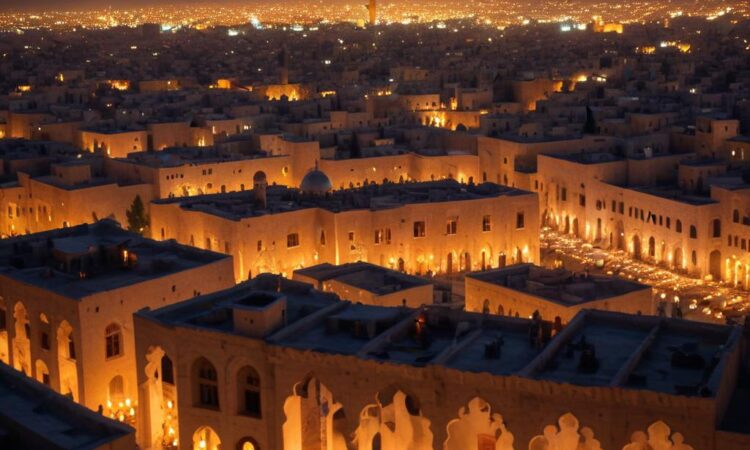Damascus Celebrates the End of an Era
Lina Sinjab finds people in the capital seizing the moment to enjoy victory: Lina Sinjab in Damascus says people find it hard to believe that 54 years of the Assad dynasty have ended.
The air in Damascus crackles with a palpable energy, a mixture of disbelief, exhilaration, and cautious optimism. For over half a century, the Assad family has held an iron grip on power, shaping the very fabric of Syrian society. Now, with the unexpected and momentous shift in the political landscape, the city breathes a collective sigh, a hesitant exhalation after years of holding its breath. The weight of expectation hangs heavy, yet the palpable relief is undeniable.
Speaking to residents across the capital, Lina Sinjab paints a vivid picture of a city grappling with the enormity of the change. The disbelief is almost universal. Years of propaganda, control, and the suppression of dissent have created a generation conditioned to accept the status quo. The sudden transition feels surreal, a dream from which they fear they may soon awaken.
“It’s like waking up from a long nightmare,” says one elderly woman, her voice trembling with emotion. “I’ve lived under Assad my whole life. I never thought I’d see this day.” Her words resonate with many others, echoing the sentiment of a generation that has known nothing but the Assad regime.
However, amidst the disbelief and uncertainty, a sense of jubilation is steadily rising. The streets, once eerily quiet under the watchful eyes of security forces, now hum with a newfound vitality. People gather in small groups, sharing stories, exchanging smiles, and cautiously voicing hopes for the future. The cautious optimism is evident in their hushed conversations and tentative celebrations.
The celebrations, however, are far from extravagant. There’s a sense of restraint, a recognition that the path ahead remains uncertain. The years of oppression have left their mark, fostering a cautious approach to unbridled joy. The celebrations are muted, intimate gatherings rather than boisterous public displays of jubilation. It is a victory tempered by the weight of history and the awareness of the challenges that lie ahead.
Young people, who have only ever known life under Assad’s rule, express a mixture of bewilderment and hope. They are the generation who will shape the future of Syria, inheriting a nation scarred by conflict and burdened by the legacy of the past. Their enthusiasm is tempered by a healthy dose of realism, understanding the monumental task that lies ahead in rebuilding their nation.
Lina Sinjab notes the palpable sense of collective holding of breath. The euphoria is real, but laced with anxiety. The fear of a return to the old ways, the uncertainty about the future, and the concerns about the stability of the new government are all present. The celebration is a tentative embrace of the possibility of a new beginning, a cautious step into an uncharted future.
The economic conditions remain precarious, the infrastructure damaged, and the social fabric torn. The challenges are immense, and the road to recovery will be long and arduous. Yet, the spirit of the people remains unbroken, their hope flickering, though tentatively, in the aftermath of this monumental change.
Many are hesitant to openly express their joy, fearing a resurgence of the oppressive regime or reprisals from those who benefited from the previous administration. The whispers of dissent that have been suppressed for decades are slowly turning into more audible voices, each one carrying the weight of years of silence.
As darkness falls over Damascus, the city lights up not just with streetlights, but with the small, flickering lights of candles and lanterns in windows, representing a silent, cautious celebration. It’s a city at a crossroads, stepping cautiously into a new era, unsure of what lies ahead but determined to create a better future for itself.
The transition is far from complete. The challenges are immense, ranging from rebuilding the shattered economy and infrastructure to addressing deep-seated social divisions and the lingering threat of internal conflict. However, the people of Damascus are seizing this moment, finding solace in the shared experience of witnessing the end of an era. This moment is a testament to their resilience, their perseverance, and their unwavering hope for a brighter future.
The stories unfolding in Damascus are a reminder that change, even when long-awaited and seemingly momentous, is a gradual process, filled with uncertainty and marked by both jubilation and apprehension. The future remains unwritten, but the people of Damascus are writing their own chapter, one filled with hope, resilience, and a cautious optimism for a future free from the shadow of the Assad dynasty.
Lina Sinjab’s reporting provides a poignant glimpse into the lives of ordinary citizens navigating this extraordinary moment in history. Their stories, filled with both relief and trepidation, paint a picture of a city emerging from the darkness, slowly but surely, embracing the possibilities of a new dawn.
The journey ahead will undoubtedly be fraught with challenges, but the people of Damascus, having witnessed the end of an era, are demonstrating a remarkable capacity for resilience, hope, and the collective determination to build a better future for themselves and generations to come. Their quiet celebrations, their cautious optimism, and their shared experience of liberation offer a powerful testament to the enduring human spirit.

